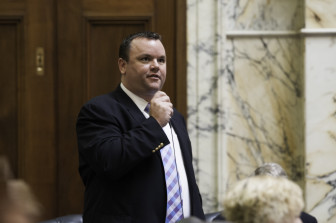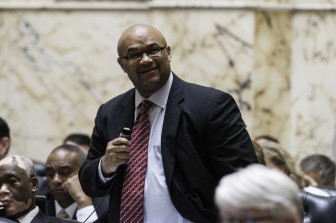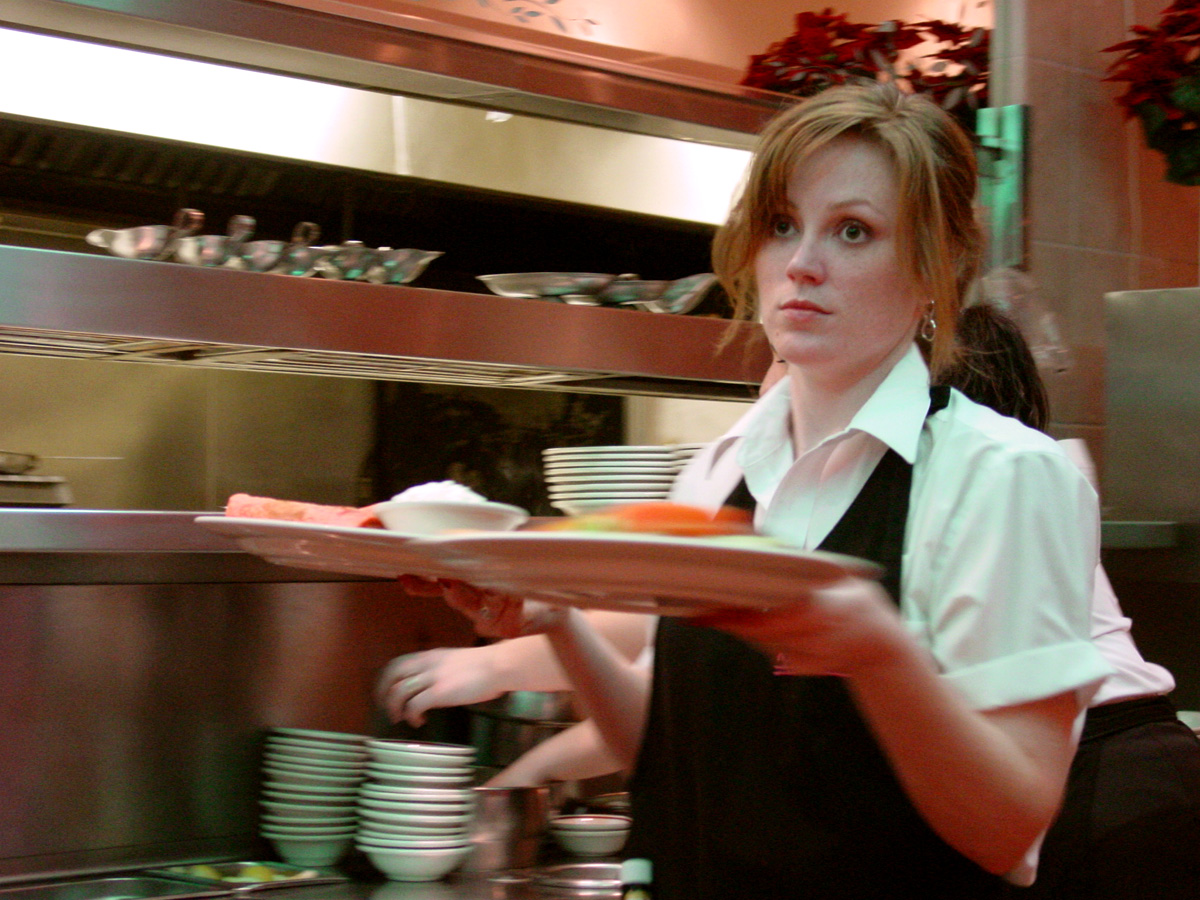By Rebecca Lessner
For MarylandReporter.com
As I sat with camera in hand, watching the House floor debate Friday from the press section, I couldn’t help but wonder if the legislators knew the very person’s job security they were arguing was my own.
The subject of the yeas and nays was HB 580, the Healthy Working Families Act. But more specifically, it was whether or not paid sick leave would flip the service industry on its head.

Del. Erick Bromwell. Photo by Rebecca Lessner for MarylandReporter.com.
“I grew up in a restaurant, I grew up in a family owned business,” said Del. Eric Bromwell, D-Baltimore.
“My wife and I own a restaurant and motel..for the past 30 years,” said Del. Wendell Beitzel, R-Garrett.
“I bartend and waitress, sometimes pulling 12-hour shifts in Bel Air,” I thought to myself, somewhat amused.
Dishing it out
So what does this bill bring to the table? As a waitress/bartender with years of experience bringing things to tables, I can dish out my own opinion.
It’s easy to sympathize with both sides of the debate, even though I lean more in favor of the small business owner’s nay-saying. I’ll tell you why.
On one hand you have legislators — most of the Democrats in the House — who believe that all people deserve paid sick leave. This bill would require employers with 15 or more employees to provide paid sick leave at the same hourly rate. An employee can rack up to one hour of paid sick leave for every 30-hours worked.
This sounds great for employees who earn minimum wage. This sounds wonderful for employees who work 9-5 jobs, or at least clock in at the same time, five days a week.
That’s not the service industry.
Scheduling is hard
“It’s hard to put together a schedule, it’s even harder to find people who are willing to work on holidays, on days where everyone else has off,” said one-time restaurant manager Bromwell, pushing for an amendment to the bill that would exclude restaurants.
He would be the first of several legislators to try to exclude the service industry and be voted down over the hour-long debate.
His comment took me back 24 hours to Thursday morning, when I was working my second job to pay off my student loans. One of our servers had called out due to a stomach flu that had been taking our employees hostage, or maybe she was just hungover.
My restaurant was left with two servers, one manager and a bartender.
Our hostess was also nowhere to be found.
Guests didn’t see that we were also short our food expeditor (expo), salad person and a line cook. My manager and I, the bartender, picked up the slack of four people during the lunch rush, while two servers worked the dining room and two cooks manned the line.
I wish I could tell you the name of where I worked, but this sort of thing happens everywhere 16-year-olds and up are hired.
Taking off for sickness
Some legislators argue sick workers will take off if they can still count on a paycheck, keeping viruses from spreading. According to Maryland’s food regulations, Comar 10.15.03.14 requires employers to insure that employees who are exhibiting symptoms of being sick do not work with food, utensils, or equipment.
However, when someone needs to make rent and pay off loans, will a server stay home for $3.63 an hour?
Am I saying, I don’t want to get an extra boost in paying my bills when I’m laid up. Of course not, everyone can use a helping hand.
This just is not a hand 56-year-old Miss Sue will factor in too much, as she considers whether or not to take time off to get the knee surgery she probably needed to have years ago. What she will consider is how many more tips she needs to earn before taking the time off, to support herself by her own means.
Sick leave abuse

Del. Dereck Davis. Photo by Rebecca Lessner for MarylandReporter.com.
“I have a lot of faith in Maryland workers,” said Del. Dereck Davis, D-Prince George’s County, chair of the Economic Matters Committee who brought the bill to the floor. “I believe that you may have some abuse, which is common, but an overwhelming majority of workers will act responsibly.”
Davis also hinted at his past experience working in the restaurant industry, as many people do. The service industry is an entry-level field, offering opportunities for kids to get their first jobs, you can walk into a restaurant with no work experience and they will probably have a place for you somewhere.
In this unique industry, you can move up from dishwasher to busser, from busser to line-cook, from line-cook to maybe, one day managing. If this bill is enacted as it stands, will these opportunities be taken away, as restaurants strive to find a more responsible worker than your average teenager? Or even an ex-convict who is trying to restart a career?
Not a reliable field
Restaurants are not a reliable field to work in and we know that going in; we don’t have reliable pay, hours or job security. We get paid in tips, based on our performance each day.
There is a rumor flying around that the place I work will be closing. One day, about 20 employees will show up for work and there will be a note on the door saying the restaurant has been sold.
There is nothing we can do about it; it’s just how the business works.
Restaurants are a different business — as are other service jobs — and they should not be grouped with other businesses in paid sick leave legislation. The legislation got preliminary approval Friday — without exempting restaurants — and it will get a final vote this week.





This is well written. As I own a business and have worked in the restaurant business for over a decade as well. People don’t realize how expensive it is to run a business that’s why most of them fail within the first 3 years and even more so within 10 years. Adding this extra expense onto the business could be enough to take the profits away. Restaurants typically only profit between 1 and 3%. Not much of a return which is why selling volume is so important.
On the other hand it is safer and more healthy for people to stay home in the food industry when they are sick. When I worked in a restaurant I never called out sick unless I was practically dying. I needed to pay my bills and couldn’t afford to call out sick.
What’s the answer? I’m not sure. I tend to side with the business as if the business goes out of business now you have lost jobs and then it won’t matter if they get paid sick leave because they will not be getting paid anyways.
This article is the opposite of rhetoric because it makes exactly zero functional arguments. I’ve never done anything but hospitality work my entire life, and if your business is so fragile that you can’t afford to keep servers with the flu from giving the flu to everybody, then DO SOMETHING ELSE.
I’m sorry, but the service industry needs to catch up with the rest of the business world. People in the service industry have been getting away with not paying their fair share of income taxes for decades because they work on cash tips. It needs to end now.
Interesting to read the words of someone who works in the business rather than a pontificating legislator whose “do-goodism” does not reflect the reality of the restaurant business..